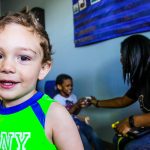
Nearing its 61-year anniversary, the Center for Autism is the oldest non-profit autism treatment center in the country.
The Northeast Philadelphia center is located at 2801 Grant Ave. and has been in operation since 2009.
Alena Subacus, the assistant director of the pre-K program, has worked at the center since its opening.
“The Center for Autism has been in Philadelphia for a long time now,” Subacus said. “It’s pretty well-known and I think that’s because, throughout Philadelphia, there is just a need for the services we provide.”

Before becoming a patient at the Center for Autism, an individual must reach out to the facility via phonecall.
“You might ask yourself, ‘Does my child–or am I–on the spectrum for having autism?”” said Judith Outten, M.D., senior child and adolescent psychiatrist at the Center for Autism. “The first step would be to give us a call to get an appointment.”
According to Kelly Nydegger, the assistant director for social competency at the Center for Autism, staff members answer all phone calls to set up initial client evaluations.
Evaluations are given by psychiatrists who work at the center.
“After an evaluation, the psychiatrist makes a recommendation for that individual,” Nydegger said. “If that recommendation is a referral to one of our programs, then that client will be placed on our referral list and be transitioned into one of our programs. A recommendation for an outside service will be made at that time too.”
The Center for Autism offers a pre-K program, an after-school social competency program, outreach services and a Saturday program.

“One of the great things about our programming structure is that we have a lot of clients who go from the pre-K program into either outpatient therapy or the social competency program,” Subacus said. “Clients will stay with the center for a long period of time and we get to see them make progress in communication, social and play skills, and then help them transition on.”
Subacus and the rest of the staff work to get to know each child individually.
“We utilize a relationship-based approach, which is pretty unique to other facilities,” Subacus said. “We really focus on developing personal relationships with our clients. Then, we learn each of their abilities and create individualized treatment goals.”
According to Dr. Outten, the physicians on staff at the Center for Autism have three main jobs.
“First, we provide evaluations for persons who think they are affected,” Dr. Outten said. “The second part of what we do is outpatient services. We have outpatient-specific and autism-specific therapists who go out and work with people of all ages.”
The third goal is to work with those who might need the services the most.
“Finally, she continued, “for our younger population, we have treatment programs in which we work specifically with children ranging from two to six years old to address core deficits.”
These core deficits usually include difficulties with communication and engagement.

“A lot of people with autism have difficulty with interactions,” Dr. Outten said. “For a child, that might be difficulty with play actions. For an adult, it might be difficulty with socializing.”
The center works to incorporate clients’ families into the treatment process.
“In all of our programs, we are working to get families more instituted into their child’s treatment,” Dr. Outten said. “We try and teach them psycho-education and help them understand what autism is and how they can help their child.”
As children progress through the different programs at the Center for Autism, they begin to interact more with one another.
“In the social competency program, for example, our groups are peer-focused,” Nydegger said. “Staff and clients work collaboratively with each other on social cues and handling emotions.”
The center also offers a Saturday program to help adults who have autism.
“We teach them different things like job skills, learning to vote, learning to make their beds, learning to cook and learning how to handle relationships,” Dr. Outten said. “We have a breadth of programs, so that people can get treatment in multiple areas.”
Staff from all programs have team meetings at the three-month mark where they review the progress of all of their clients.
“Ninety days is how long it takes us to feel that we have collected enough data on our treatment goals to make decisions on the progress of our clients,” Nydegger said. “After reviewing that data, we can determine where to go next.”
Dr. Outten believes that Pennsylvania is one of the best providers of autism treatment in the nation, and she attributes this largely to the Center for Autism.
“It really is a multi-faceted organization,” Dr. Outten said. “It reaches consumers of all ages who are affected by autism.”
For Jeff Scott, site coordinator at the Center for Autism, the greatest part of the job is being to help so many people.
“I love being able to tell people I work at the Center for Autism,” Scott said. “We’re always growing! To work at a place that does such great things for people––and keeps expanding–– is truly amazing.”
Featured above: Therapists Christina Costello and Jessica Harris, patients Alex D’Andrea, Luke Hernandez, Zai’ki Morris, Javier Hernandez and Gabriel Householder.
-Texts, images and video by Michelle Bresnahan and Taylor Carson.












Be the first to comment